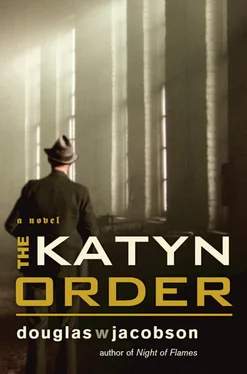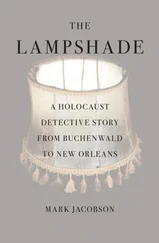Adam had just barely made it out of Warsaw himself after being wounded when the SS assaulted the AK hospital in Raczynski Palace. The bullet that mangled his ear had knocked him unconscious, which turned out to be a stroke of luck since he’d been left for dead by the SS troopers. When he finally came to, he had managed to crawl out of the palace, and into the street where he’d passed out again. An elderly couple found him and took him to their hiding place, a cellar in an adjacent building. They had tried their best to nurse him, but with the lack of medical supplies, infection had set in. He had been so dizzy most of the time he couldn’t stand, much less walk. It had taken a month to recover, and by the time he managed to slip out of the city, Natalia, like everyone else, had disappeared in the chaos.
And now he was on his way to meet her.
The only time in five years he had let his guard down had been with Natalia. They’d only spent a few hours together, sitting in a church, then huddling in the ammunition shelter. But there was something about her, something that had penetrated the protective shell he’d so meticulously created, the shell that sealed off his emotions and kept him going. And it frightened him. It had frightened him that last night in Warsaw, when he had run off on the futile mission to Raczynski Palace… then watched her from a window like a schoolboy.
Adam forced himself to think about something other than what he would say when he met her. Had she found Banach? Could his uncle still be alive after all this time? Was it possible he might be re-united with the man who meant more to him than life itself?
And the phrase— pathetic pawns on the perilous chessboard —the phrase Banach used in his paper, the same phrase Hans Frank used. Where would she have learned it, if not from Banach?
He looked out the window, rubbing the numb left side of his face, and watched the Polish countryside slip past: gray buildings in war-weary, gray towns, dusty roads winding through the wheat fields, wagons pulled by horses and oxen. He imagined it looked the same as it always had, century after century… war after war.
Adam reflected on his conversation with Whitehall the other day when they were alone in the drawing room of the mansion before dinner with Kovalenko. One of Whitehall’s comments had struck a chord: Get proof about Katyn, something even the Americans can’t ignore. He thought about the comment, remembering the Poles he knew in Chicago—most of them, like himself, first or second generation immigrants, and all of them patriotic Americans. While they kept alive their Polish heritage, they were as fiercely proud to be an American as he was.
But Whitehall’s comment had made him think. If there were solid proof of Russia’s treachery at Katyn, would the Americans stand up to Stalin and help Poland? Would his adopted country stand beside the country of his birth at the hour of her greatest need?
Adam knew what the answer would be if he asked any of the hundreds of AK commandos he’d fought with over the years, the proud, stubborn Poles who were fighting to the death to win their freedom. The British and the French may have let them down, but Adam knew that every one of them believed America would be there when it counted. He hoped it was true.
He suddenly felt very tired. He let his head fall back on the seat and closed his eyes, wondering what he would say when he met Natalia.
13 JUNE
THE LATE AFTERNOON SUN was quite warm when Adam exited Krakow’s Central Station with his suit coat draped over his arm. For the first time since he’d been deported by the Germans in 1939, he walked the familiar streets leading to the Stare Miasto District, grateful the city that had once been his home had survived the war with little damage.
Sweat trickled down the back of his collar as he crossed the Planty park and stopped outside of St. Florian’s Gate to get his bearings. He looked around, observing his surroundings and noticing faces. Then he passed through the gate and the remnants of the ancient fortifications, and entered the old city.
Adam walked a short distance down Florianska Street, weaving through crowds of people. He turned into a narrow cobblestone lane, barely wide enough for a horse and carriage, then circled around and came back to where he’d started to make sure he wasn’t being followed. Repeating the process another time, he continued down Florianska to the Rynek Glowny.
Adam paused for a moment at the northern end of the vast market square, taking in the view of the Mariacki Church, the Cloth Hall, the vendors’ horses and carriages. He’d spent many Sunday afternoons on this square as a boy, sitting at a café with his aunt and uncle, eating ice cream and feeding the pigeons. And he’d spent many hours here after he returned from America, sitting at those same cafés, sipping coffee or beer while studying law books.
The square was much the same, largely undamaged by the war, but it felt different. It was quieter, more subdued. A few of the vendors were at their stations, but there was little in their carriages for sale. And many of the cafés were closed, their awnings rolled up, chairs stacked upon the tables. Adam took a last look around, then walked across the square, proceeding south along Grodzka to Wawel Castle, heading for the rendezvous point in the Kazimierz District.
An hour later, he entered the courtyard of the Church of Archangel Michael and Saint Stanislaus. There was no one around. Adam checked his watch—five o’clock—he was right on time. He lit a cigarette and wandered over to the pond, pretending to study the statue of Saint Stanislaus in the center. The saint had a stern expression on his stone face, as if he were disappointed by human frailty. A few minutes passed. Then a few more and still no one appeared except an elderly man who looked like a caretaker, carrying a basket filled with grass clippings.
The elderly man walked toward him and seemed to be heading for the gate when he suddenly dropped the basket at Adam’s feet. The grass spilled out, covering Adam’s shoes.
“Ach, what a fool. I’m sorry, sir.” The man bent over and scooped the clippings off the ground as Adam shook his shoes clear.
Adam instinctively bent down to help, and the man whispered, “Dietla and Starowislna, at six o’clock. Get on the tram for Podgorze.” Then the man picked up the last of the clippings and headed out of the gate.
Despite all of her efforts to keep her emotions under control, Natalia gasped when Adam boarded the tram. She quickly covered it up with a cough when the woman across the aisle glanced at her, but it had been enough, and he turned in her direction. Their eyes met for an instant before the crowd pushed him toward the front of the car.
She could feel the flush in her face and turned to look out the window, not trusting herself if their eyes should happen to meet again. Is it really him? Several minutes passed. Finally she couldn’t stand it any longer and shifted in her seat, stealing a glance at the front of the car, certain she had made a mistake.
Adam was halfway up the aisle, wedged between two taller men. He wore a dark blue suit and carried a briefcase. He looked older. There were creases at the corners of his eyes that she didn’t remember, and his shoulders sagged a bit, as though he was tired. She swallowed hard when she noticed the thin scar on the left side of his face and his ragged left ear. Half of it had been torn away. Tears clouded her vision, and she turned back to the window.
The tram rumbled over the Vistula River, and Natalia gazed at the slow-moving gray water, fighting the urge to look at him, to get up and push through the crowd. Vivid memories of the last time she had seen him suddenly returned with a rush—Dluga Street in Warsaw, fires raging out of control and artillery shells shrieking overhead as he headed off to the hospital in Raczynski Palace in his suicidal effort to protect the trapped and wounded AK commandos. Natalia had been certain that night she’d never see him again. Then she had heard the reports a week later, confirming that the SS had murdered everyone in the hospital.
Читать дальше












